 So what do the Chinese Government and the Rightwing mega-lobbying group calling itself the U.S. Chamber of Commerce have in common? Apparently, they are both interested in hacking into the computer networks of their perceived political opponents and appear to be using very similar techniques and tools to do so, as The Nation's Lee Fang reported on Monday.
So what do the Chinese Government and the Rightwing mega-lobbying group calling itself the U.S. Chamber of Commerce have in common? Apparently, they are both interested in hacking into the computer networks of their perceived political opponents and appear to be using very similar techniques and tools to do so, as The Nation's Lee Fang reported on Monday.
A computer security expert cited by Fang notes "lots of overlap" between the recent documented Chinese military cyber hacks and tactics proposed for use by federal contractors working with the U.S. Chamber and their attorneys to discredit their enemies.
Readers of The BRAD BLOG will likely remember the emails hacked by Anonymous in February of 2011 revealing that three U.S. government defense contractors had been working with U.S. Chamber of Commerce attorneys from the Washington D.C. lobbying/law firm of Hunton & Williams to develop a $12 million scheme to target their political opponents --- such as unions and progressive organizations --- by hacking into their computer networks, infiltrating the groups, planting false information in hopes of discrediting them, and using other sophisticated computer tools developed for the "War on Terror" by the three cyber-security firms.
One of the perceived political opponents targeted by the Chamber, we would learn from the hacked emails, was I. Personal details about myself and my family showed up in both the emails and a PowerPoint presentation for the U.S. Chamber prepared by "Team Themis," the name used for the illicit project by the three government contractors, HBGary Federal, Palintir, and Berico.

Lee Fang, who was then a reporter for Think Progress, and Scott Keyes, who still is, originally broke the revelations from the hacked HBGary Federal emails there. A slide in one of the presentations prepared for the U.S. Chamber scheme described the effort to "Discredit, Confuse, Shame, Combat, Infiltrate [and] Fracture" the progressive organizations with online tools, hacking and other dirty tricks in order to "mitigate [the] effect of adversarial groups."
Another slide included a photograph of me, and other personal details meant to target VelvetRevolution.us, a not-for-profit good government group (co-founded by The BRAD BLOG) which has long called for accountability for the Chamber and its mafia-like political tactics.
[Our main story on the creepy scheme was here, along with a number of follow-ups, such as the ones here, here and here.]
The news of the hack and its revelations quickly garnered front-page headlines in the U.S. and around the world as an international scandal, even as the Chamber denied having knowledge of the specific cyber-terror threat clearly being created on their behalf by the three defense contractors, and even as neither they nor their attorneys have yet to face any accountability for the scheme to terrorize public organizations and private individuals, such as myself and my family. An official Dept. of Justice investigation into the matter --- and even a brief attempt to do so by Democrats in Congress --- was no doubt crippled by both the enormous power of the Chamber, and the fact that it was the DoJ itself which had referred Bank of America to the very same defense contractors in a parallel scheme mirroring the Chamber's, as revealed by the same email hack. That scheme was being prepared to target perceived supporters of WikiLeaks at the time, including journalist Glenn Greenwald.
"[W]ho better to develop a corporate information reconnaissance capability than companies that have been market leaders within the DoD and Intelligence Community," read one of the proposals [PDF] created by "Team Themis," as delivered to the U.S. Chamber of Commerce's law firm Hunton & Williams.
In Monday's report at The Nation, Fang details how recent cyber attacks against U.S. interests, which appear to be emanating from the Chinese Military, mirror tactics used by the U.S. Chamber's thugs in the eventually aborted 2010/2011 attempt to pull off what Fang describes as "one of the most brazen political espionage efforts in recent memory."


 Sunday 'Close Enough' Toons
Sunday 'Close Enough' Toons A Pretty Weak 'Strongman': 'BradCast' 10/30/25
A Pretty Weak 'Strongman': 'BradCast' 10/30/25 'Green News Report' 10/30/25
'Green News Report' 10/30/25
 Proposal for 'First Politically Viable Wealth Tax' Takes Shape in CA: 'BradCast' 10/29/25
Proposal for 'First Politically Viable Wealth Tax' Takes Shape in CA: 'BradCast' 10/29/25 Monster Storm, Endless Wars, Gamed Elections:
Monster Storm, Endless Wars, Gamed Elections: 'Green News Report' 10/28/25
'Green News Report' 10/28/25 Let's Play 'Who Wants
Let's Play 'Who Wants Sunday 'Cartoonists Dilemma' Toons
Sunday 'Cartoonists Dilemma' Toons Exiled NOAA Scientists Resurrect Critical Disaster Database: 'BradCast' 10/23/25
Exiled NOAA Scientists Resurrect Critical Disaster Database: 'BradCast' 10/23/25  'Green News Report' 10/23/25
'Green News Report' 10/23/25 Trump-Allied GOP Partisan Buys Dominion Voting Systems: 'BradCast' 10/22/25
Trump-Allied GOP Partisan Buys Dominion Voting Systems: 'BradCast' 10/22/25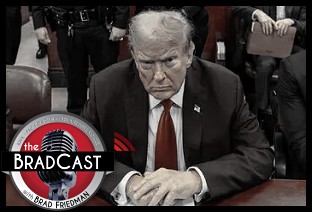 Trump, Republican Law(lessness) & (Dis)Order: 'BradCast' 10/21/25
Trump, Republican Law(lessness) & (Dis)Order: 'BradCast' 10/21/25 'Green News Report' 10/21/25
'Green News Report' 10/21/25 Celebrating 'No Kings': 'BradCast' 10/20/25
Celebrating 'No Kings': 'BradCast' 10/20/25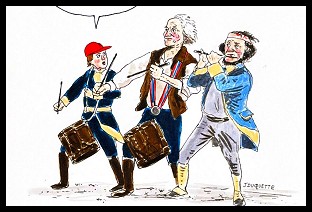 Sunday 'How It Started' Toons
Sunday 'How It Started' Toons SCOTUS Repubs Appear Ready to Gut Rest of Voting Rights Act: 'BradCast' 10/16/25
SCOTUS Repubs Appear Ready to Gut Rest of Voting Rights Act: 'BradCast' 10/16/25 'Green News Report' 10/16/25
'Green News Report' 10/16/25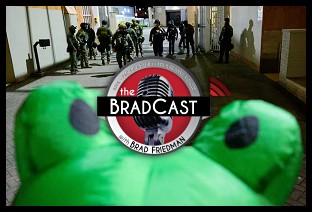 The 'Epstein Shutdown' and Other Autocratic Nightmares: 'BradCast' 10/15/25
The 'Epstein Shutdown' and Other Autocratic Nightmares: 'BradCast' 10/15/25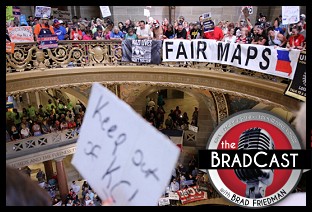 Group Vows to Block MO's GOP U.S. House Gerrymander: 'BradCast' 10/14/25
Group Vows to Block MO's GOP U.S. House Gerrymander: 'BradCast' 10/14/25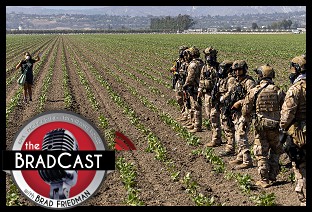 Trump Labor Dept. Warns Trump Policies Sparking Food Crisis: 'BradCast' 10/9/25
Trump Labor Dept. Warns Trump Policies Sparking Food Crisis: 'BradCast' 10/9/25 Trump's Losing Battles: 'BradCast' 10/8/25
Trump's Losing Battles: 'BradCast' 10/8/25 Trump, Roberts and His Stacked, Packed and Captured SCOTUS: 'BradCast' 10/7/25
Trump, Roberts and His Stacked, Packed and Captured SCOTUS: 'BradCast' 10/7/25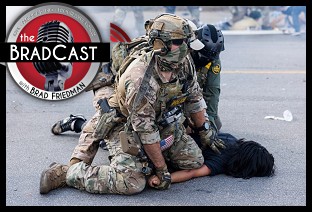 Trump Attempting His 'Invasion from Within': 'BradCast' 10/6/25
Trump Attempting His 'Invasion from Within': 'BradCast' 10/6/25 Biden Budget Expert: Mass Firings in Shutdown 'Illegal': 'BradCast' 10/2/25
Biden Budget Expert: Mass Firings in Shutdown 'Illegal': 'BradCast' 10/2/25 Why is DOJ Suing 'Blue' States for Their Voter Databases?: 'BradCast' 10/1/25
Why is DOJ Suing 'Blue' States for Their Voter Databases?: 'BradCast' 10/1/25
 VA GOP VOTER REG FRAUDSTER OFF HOOK
VA GOP VOTER REG FRAUDSTER OFF HOOK Criminal GOP Voter Registration Fraud Probe Expanding in VA
Criminal GOP Voter Registration Fraud Probe Expanding in VA DOJ PROBE SOUGHT AFTER VA ARREST
DOJ PROBE SOUGHT AFTER VA ARREST Arrest in VA: GOP Voter Reg Scandal Widens
Arrest in VA: GOP Voter Reg Scandal Widens ALL TOGETHER: ROVE, SPROUL, KOCHS, RNC
ALL TOGETHER: ROVE, SPROUL, KOCHS, RNC LATimes: RNC's 'Fired' Sproul Working for Repubs in 'as Many as 30 States'
LATimes: RNC's 'Fired' Sproul Working for Repubs in 'as Many as 30 States' 'Fired' Sproul Group 'Cloned', Still Working for Republicans in At Least 10 States
'Fired' Sproul Group 'Cloned', Still Working for Republicans in At Least 10 States FINALLY: FOX ON GOP REG FRAUD SCANDAL
FINALLY: FOX ON GOP REG FRAUD SCANDAL COLORADO FOLLOWS FLORIDA WITH GOP CRIMINAL INVESTIGATION
COLORADO FOLLOWS FLORIDA WITH GOP CRIMINAL INVESTIGATION CRIMINAL PROBE LAUNCHED INTO GOP VOTER REGISTRATION FRAUD SCANDAL IN FL
CRIMINAL PROBE LAUNCHED INTO GOP VOTER REGISTRATION FRAUD SCANDAL IN FL Brad Breaks PA Photo ID & GOP Registration Fraud Scandal News on Hartmann TV
Brad Breaks PA Photo ID & GOP Registration Fraud Scandal News on Hartmann TV  CAUGHT ON TAPE: COORDINATED NATIONWIDE GOP VOTER REG SCAM
CAUGHT ON TAPE: COORDINATED NATIONWIDE GOP VOTER REG SCAM CRIMINAL ELECTION FRAUD COMPLAINT FILED AGAINST GOP 'FRAUD' FIRM
CRIMINAL ELECTION FRAUD COMPLAINT FILED AGAINST GOP 'FRAUD' FIRM RICK SCOTT GETS ROLLED IN GOP REGISTRATION FRAUD SCANDAL
RICK SCOTT GETS ROLLED IN GOP REGISTRATION FRAUD SCANDAL VIDEO: Brad Breaks GOP Reg Fraud Scandal on Hartmann TV
VIDEO: Brad Breaks GOP Reg Fraud Scandal on Hartmann TV RNC FIRES NATIONAL VOTER REGISTRATION FIRM FOR FRAUD
RNC FIRES NATIONAL VOTER REGISTRATION FIRM FOR FRAUD EXCLUSIVE: Intvw w/ FL Official Who First Discovered GOP Reg Fraud
EXCLUSIVE: Intvw w/ FL Official Who First Discovered GOP Reg Fraud GOP REGISTRATION FRAUD FOUND IN FL
GOP REGISTRATION FRAUD FOUND IN FL

































